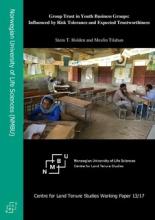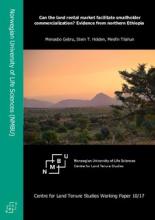Land Library
Welcome to the Land Portal Library. Explore our vast collection of open-access resources (over 74,000) including reports, journal articles, research papers, peer-reviewed publications, legal documents, videos and much more.
/ library resources
Showing items 46 through 54 of 300.This chapter is written for the European Commission for a book to be published by Springer on The Role of Smallholder Farms in Food and Nutrition Security. The author takes full responsibility for the content.
We analyzed lab-in-the-field trust and risk experiment with 1125 youth in 119 youth groups established as primary cooperatives to develop a joint business. The experiments were implemented using classrooms in local schools as field labs.
Although development intervention programs can have far-reaching impacts beyond their stated objective, there have been few careful studies of unintended outcomes of such programs.
The paper utilizes household panel data to investigate whether the land rental market can facilitate improved access to land for land-poor tenant households over time and thereby facilitate expansion of their farming activity.
Climate risk represents an increasing threat to poor and vulnerable farmers in drought-prone areas of Africa. This study assesses the fertilizer adoption responses of food insecure farmers in Malawi, where Drought Tolerant (DT) maize was recently introduced.
The paper provides a case study of the conversion of state land in the Commune of Limonade, from a community-controlled agricultural economy to a large-scale agro-export banana plantation called Agritrans.
The impacts of large-scale agricultural investments on rural communities’ land ownership, food security, productivity, income, and access to education and health differ within and between communities depending on business and government influence.
A severe outbreak of Côte d’Ivoire lethal yellowing disease (CILY) has been wreaking havoc throughout coconut farms since 2013.
This report outlines administrative ways to harmonise state and traditional institutions in terms of land justice in Uganda. Customary justice within the traditional clan system in Uganda offers big advantages over the state judicial system in terms of physical access and costs.









